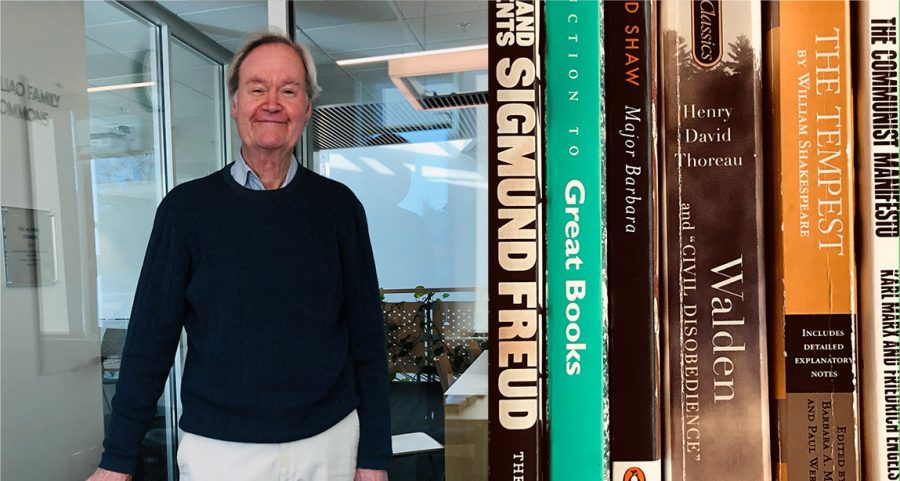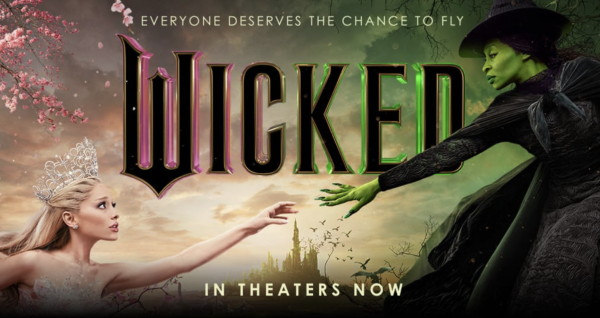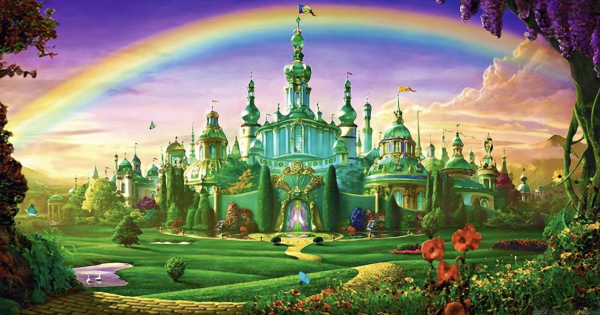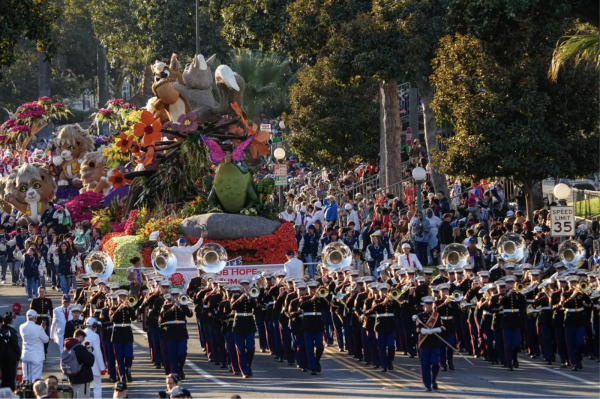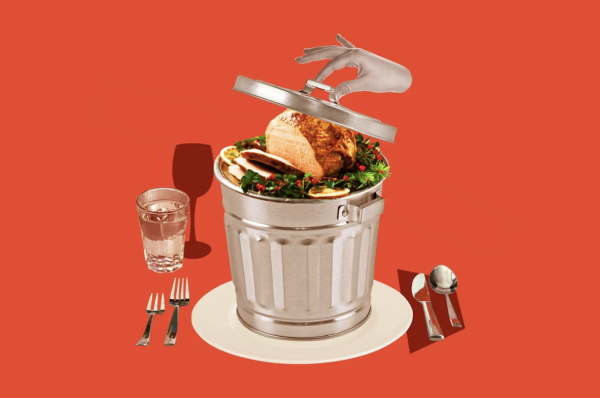“What is the Good Life?”
An Interview with Mr. Bachmann on his Great Books Class
Photo courtesy Audrey Jung
Mr. Bachmann and several books in the class curriculum
Great Books is a senior seminar class that explores Western classics in pursuit of the question, “What is the Good Life?” Through readings and vibrant in-class discussions, students engage with philosophers from Aristotle to Virginia Woolf and Ayn Rand to Karl Marx, defining their own “good lives” in a culminating paper.
Great Books is a remarkable class, taught by a truly remarkable teacher. I recently sat down with Mr. Bachmann to discuss his early interest in the Great Books, his guiding principles for the class, and what he hopes students will take away.
What were your interests growing up? Were you a big reader?
I was always a big reader. I remember going back to elementary school and loving history, biographies, and novels. I got going pretty early on.
I loved sports when I was a kid. I played a lot of basketball and baseball. Golf’s been a continuing interest. I’ve always loved the theater, movies, and live performances. So I’m a little dull––a lot of the things I liked when I was ten I still like.
What are the “Great Books” and what experiences developed your interest in studying them?
I was actually introduced to the concept of the Great Books by my dad, who had taken them in his first class in Chicago when he was young. His teacher from that time was Robert Hutchins, who was the president of the University of Chicago. He moved to Santa Barbara, which is my hometown, and so I got to see him personally and hear him talk about the Great Books. So probably by about sixteen or seventeen, I was really interested in them. Then, I found a small program like that when I got to Berkeley as a freshman.
What was that program like?
It was one of those life-changing moments. It was called a program in history and literature. We would all live together, have our classes in the dorm and eat together, and it made a large university into a small school.
We stayed together for two years. It was interdisciplinary and had a lot of the features that the current Great Books class here has. I’ve got a lot of my ideas from it.
Why do you think studying the “Great Books” is important? What impact do thinkers who lived hundreds if not thousands of years ago continue to have on us today?
I think intellectual humility is a wonderful thing. I love when we are humble enough to imagine that there are thinkers who lived before us whose words and ideas have stood the test of time. We shouldn’t fall into the assumption of presentism that the only cool idea is the new idea.
How is it that you came to teach “Great Books”?
There was a Great Books class here taught by a couple of veteran teachers when I first arrived, and so I was kind of licking my chops for it for five or six years. And then, when those people retired, I inherited the class in 1986 and I’ve been teaching it ever since.
“What is the Good Life?” Why is this the central question of the class?
The “Good Life” takes many pages to answer, but I think it’s knowing oneself as intimately as possible and honoring one’s hopes and dreams. Knowing one’s strengths, knowing areas where we are maybe not so strong. Having the courage to live the life we imagine in our dreams.
Did you know from the start that you wanted this question to guide the class framework? Or did it come up later on?
It’s interesting you asked that. I came to the “Good Life” assignment the second year I taught the class, so it came early. The first year was a bit of trial and error, but then I realized it’s always the fundamental question of any kind of liberal arts enterprise. That’s what you’re doing. You’re trying to craft the life most appropriate for you.
On the first day of class, you introduced a “facts, interpretation, and evaluation” approach. Could you explain what this framework is and why it’s important?
I took training in Great Books with the University of Chicago Foundation, which puts out our anthology, and it was one of the first things you learned.
It’s very important to understand what a fact is, that we can agree to 2 + 2 = 4. What an interpretation of a text is, and how that can differ depending on how you understand certain words and certain constructions. And then and only then, do we have the right to form an evaluative opinion about whether it’s good or bad or whether we like it or not because we have to know it before we can draw that judgment.
It requires intellectual patience, and I think it’s a huge gift for us when we can pause long enough to ask, “Where’s the evidence for this conclusion I’m starting to draw? Could there be another interpretation that would reasonably challenge my own?”
As I mentioned in class, that’s how most people make their living. It’s how doctors make their living. It’s how attorneys make their living. It’s how financial people make their living. It’s how musicians make their living and interpret a piece of music. And so, I think it’s really important to get experienced and skilled at interpretation.
The class studies writers from four different categories: head, heart, fate, and choice. What do these categories mean and why in this order?
I’ve taught this course over the decades in a variety of different orders––sometimes chronologically, sometimes thematically. As I was sitting down to assess whether it made sense, about ten years ago, to continue with the course or not, I created this set of themes. It felt like it worked, so I’ve kind of stuck with it ever since.
Most figures don’t fall into each category purely, but with Aristotle, for example, or Plato, we know they’re intellectual people who believe that thinking is your best road to the Good Life. We know that Thoreau and Kant and King are perhaps a bit more intuitive and want to consider one’s individual good life also in the context of one’s obligation and affection for others.
I think it’s really important to know what the limits are on us. And so, Marx and Freud––writers of fate––say there are certain things that perhaps we cannot change. It’s good to know those and know then how to make good choices, the final category within those parameters.
You’ve touched on this a bit, but how did you choose the reading list? Did you have certain criteria for what did and didn’t go in?
They stood the test of time. That I felt that they would help us on our Good Life journey was really the number one criteria.
I had certain favorites I knew I was going to teach no matter what, Shakespeare being paramount. I started Shaw fairly early. I always did Aristotle because he just seems so much at the core of the Great Books enterprise and sensibility.
A lot of those people we worked with this fall I’ve had for a long time, but then people have come and gone according to circumstances. For example, I made a fair number of changes in 2021 because we went to the COVID schedule that we’re on right now. I had to work around having fewer days and maybe fewer papers.
I kept the core of the course and then added a few things. For example, that “History as End” essay we read that came out just in the last year or so, because I thought it was incredibly important at the moment to read that. And I thought during some of the DEI work the school was doing, that reading DuBois’ notion of having a double identity would help us all become more sensitive to what we’re like when we walk around on this campus coming from different backgrounds.
If you could have lunch with any of the Great Books writers, who would it be with and what would you talk about?
It would be Shakespeare, without question, and whatever he wants to talk about would be it! But I would ask him, “How did he have the imagination to get inside so many different characters that seem to cover the breadth of human experience and the depth of human experience?”
That surprised me! I thought you were going to say Thoreau for sure.
I’m very fond of Thoreau, but he’s a bit of a fastball across the plate. You know what you’re going to get with Thoreau. Shakespeare is endlessly complex and ambiguous. He forces us to explore our preconceived notions and develop an imaginative empathy for almost any human being he presents to us. There’s just a richness to Shakespeare that’s hard to top.
Each year, students write a paper on what they believe is the Good Life. What’s the most interesting response that you’ve gotten?
Boy, I’ve gotten so many interesting responses. I think I probably enjoyed the creative efforts the most. I love it when it feels as if the student is really asking the question from her own moment, you know, like in December of the senior year. The ones that feel particularly sincere and authentic are my favorites, but that would be like choosing among children, so I can’t quite do that.
In what ways, if any, do you see your students grow during the class? What do you hope they’ll take away?
I hope they’ll take away the distinction between fact, interpretation, and evaluation, which I think is a huge intellectual awareness. I hope they’ll advance their interdisciplinary sensibilities. So it’s not just English class or history class, but when you ask a question, you’re going to flow across the curriculum in order to get a convincing answer for it.
I love when people seem genuinely interested in other people’s views, particularly when they disagree with one’s own. I’m most excited when students can find the joy of intellectual diversity and have fun with it and respect it. In their senior year, when they’re applying to college and trying to get good grades and please the outside world, I want to take them inside themselves and allow them to marinate for a while. When I feel that’s happening, it’s really rewarding.
Let’s say somebody doesn’t take the class but wants to learn more about the Good Life. What advice would you give them?
I would tackle any of the writers that they might find interesting, including any of the writers in the course. I think the anthology we have is a good starter because you can get a good little glimpse of a variety of authors and a variety of points of view.
What is it the reader wants to get out of the experience? And then, if they asked me we would try to sculpt a reading list according to their particular needs and priorities.
What has your path looked like searching for and living out your Good Life?
I think reading these authors when I was young and making friends with people who took this all very seriously allowed me to be very self-conscious about my Good Life. Through studying in my twenties and some trial and error to see what was really going to fit, I knew pretty early on––and there’s a new happiness study that just came out that reaffirms this––that long-term relationships are probably the number one component to human happiness.
Find an avocation, something that you would do whether you were paid for it or not. Spending your day that way is a great gift and Prep has afforded me that experience for a long time, from my twenties to now. To change my role, grow my role, and try many things. To collaborate with many people. That has been really, really rewarding and continues to be rewarding.
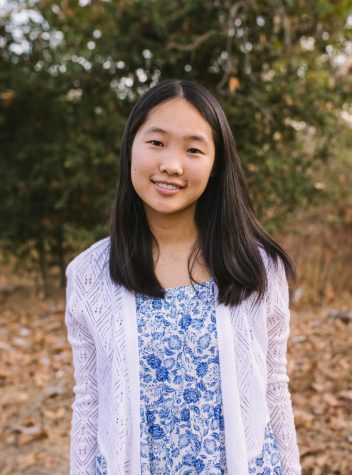
Grade: 12
Years on Staff: 4
Why are you writing for the Flintridge Press?
To address issues relevant to our time, to express ideas through writing,...

